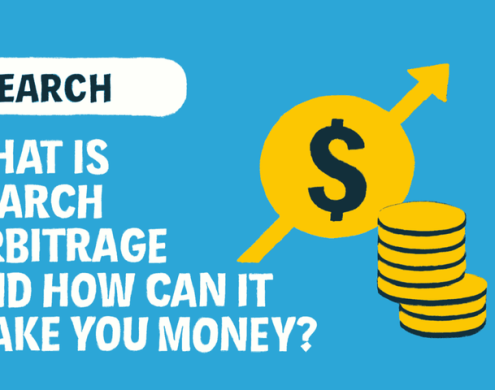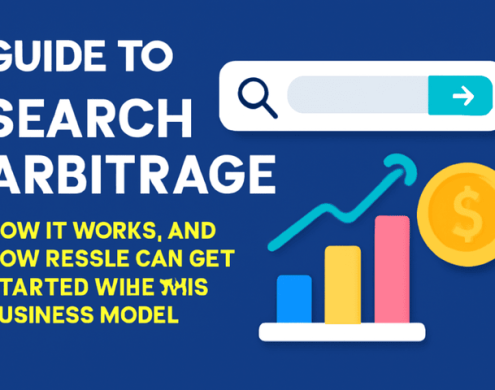Currently Empty: $0.00

How Traffic Arbitrage Businesses Are Purchased and Sold
By purchasing traffic at a reduced cost and reselling it at a higher price, traffic arbitrage provides a potent means of making money in the realm of digital marketing. This tactic is buying online traffic from an inexpensive source and directing it to offerings or websites that can profit from the visitors. This thorough book will cover all you need to know, whether you’re an entrepreneur hoping to start your own traffic arbitrage company or are interested in learning how to acquire and sell one.
The procedures for purchasing and selling traffic arbitrage enterprises, the essential elements of a profitable arbitrage firm, and the theory and tactics required for success will all be covered in this article.
Traffic Arbitrage: What Is It?
It’s important to comprehend what traffic arbitrage is before delving into its commercial aspects. Through the use of traffic arbitrage, a company can purchase cheap traffic and transform it into revenue by sending it to affiliate products, deals, or advertisements that generate a larger profit.
The idea is straightforward: you buy cheap traffic from a source and direct it to affiliate items or websites that make more money per visitor. Your objective is to generate more revenue from the traffic than you spent on it.
For instance, you may spend $10 on 1,000 visits from a low-cost traffic source like display networks or social media advertisements. After rerouting that traffic to a high-converting offer, such an affiliate program, you can profit from the initial expenditure by $20 for every sale.
Although it necessitates a thorough grasp of traffic sources, conversion optimization, and monetization strategies, traffic arbitrage can be a profitable business strategy.
A Comprehensive Guide to Buying and Selling Traffic Arbitrage Businesses
After discussing the fundamentals of traffic arbitrage, let’s examine the procedure for purchasing and disposing of a traffic arbitrage company. There are a number of crucial considerations to make when deciding whether to sell your traffic arbitrage firm or purchase an already-existing one.
1. Comprehending the Business Model
It is crucial to first understand how a traffic arbitrage firm functions in order to buy and sell it successfully. The key to a profitable traffic arbitrage business is effectively generating and monetizing traffic. Here is a summary of the essential elements:
Purchasing traffic from inexpensive sources is known as traffic acquisition. Search engine ads (Google Ads, Bing), social media ads (Facebook, Instagram, TikTok), and display advertising networks (PropellerAds, RevContent, Taboola) are examples of common traffic sources.
Monetization: The traffic must be made profitable after it has been obtained. The majority of traffic arbitrage companies rely on affiliate marketing, display adverts, or Cost Per Thousand (CPM) networks to generate revenue. Directing people to deals or websites where you can make more money per click or impression than you spent on traffic is your aim.
Analytics and Tracking: Monitoring performance is crucial to the success of any traffic arbitrage company. To make sure you are profitable, you need to track important metrics including click-through rates (CTR), conversion rates, cost per acquisition (CPA), and return on ad spend (ROAS).
Optimization and Scaling: Long-term success depends on ongoing testing and optimization, just like in any other firm. To determine the most lucrative combinations, test various landing pages, offers, and traffic sources. You can scale your firm by raising your ad spend or diversifying your traffic sources when you’ve found profitable settings.
2. Finding a Lucrative Traffic Arbitrage Company to Purchase
To make sure you’re investing in a successful venture, there are a number of considerations you should make when considering to purchase a traffic arbitrage business.
Important Points to Remember:
Traffic Sources: Examine the sources of traffic that the company uses. Seek for a variety of dependable and reasonably priced traffic sources. Steer clear of companies that only use one source of traffic because this raises the possibility of instability.
Methods of Monetization: Recognize how the company makes money off of traffic. Verify whether they are utilizing networks such as Google AdSense, affiliate programs, or direct advertisements. Analyze the return on investment for every monetization strategy.
Revenue and Profitability: Examine the company’s financial records. What are the typical monthly profits and revenues? Is the company expanding or contracting? Make sure you confirm these figures using thorough financial accounts or data access.
Ad Spend Efficiency: The connection between ad spend and income production is one of the most important elements of a traffic arbitrage business. Seek out companies with good profits and cheap ad expenditure per acquisition. Companies with large profit margins are more enduring and offer greater growth possibilities.
previous Performance: Ask for the company’s previous performance information. Examine previous campaigns to see if they were durable and successful. Examine seasonality patterns and determine whether short-term or long-term variables are responsible for revenue surges.
Traffic Quality: Verify that the company is receiving high-quality traffic. Bots and click farms are examples of low-quality traffic that will not convert properly and could result in ad network penalties.
3. How to Invest in a Traffic Arbitrage Company
The next step after deciding a profitable traffic arbitrage company to purchase is to finalize the deal. Purchasing a traffic arbitrage company usually entails the following steps:
3.1. Due Diligence
You must do out extensive due diligence before buying the company. This entails examining the legitimacy of revenue streams, validating traffic quality, and certifying the financials. Employing a third-party specialist to audit the company and its data can be a good idea.
3.2. Dispute Resolution
The business’s pricing, asset transfers, and continuing support will be the main topics of discussion during the negotiating process. Make sure you bargain for a reasonable price given the company’s present worth and prospects for expansion. Additionally, you should go over provisions pertaining to customer relations, personnel transitions (if any), and non-compete agreements.
3.3. Agreement for Transactions
Signing a formal agreement is the next stage once negotiations are over. The transfer of assets (such as website domains, traffic sources, ad accounts, and affiliate agreements), terms of payment, and any warranties or guarantees regarding business performance should all be covered in this agreement.
3.4. Transition After Purchase
You’ll need to move the activities after you buy the traffic arbitrage company. This could entail changing payment information, moving ad accounts, and modifying the team (if any). Seize the chance to gain insight into the intricacies of managing the business if the former owner is prepared to provide assistance.
4. How to Make Money from Traffic Arbitrage
There are a few crucial procedures to take in order to optimize the sale price if you have established a profitable traffic arbitrage firm and are ready to sell it.
Important Things to Think About When Selling:
Clean Financials: Verifiable and clean financial records are what prospective purchasers will want to see. Make sure that every expense and revenue is properly recorded. To make sure the books are in order, try to get a financial professional.
Boost Business Value: Concentrate on growing your traffic arbitrage company in order to raise its worth. A company with steady, increasing sales is more valuable than one with erratic earnings. Think about increasing conversion rates, broadening your sources of traffic, and refining your monetization techniques.
Provide a Comprehensive Information Packet: When selling a traffic arbitrage company, provide a comprehensive information packet that includes the company’s earnings, costs, traffic sources, and monetization strategies. This package will assist prospective purchasers in comprehending the worth of the company.
Find a Buyer: You can sell your traffic arbitrage business privately or through a variety of online marketplaces. You can connect with possible buyers and put businesses for sale on marketplaces such as Flippa, Empire Flippers, and WebsiteBroker.
Close the Deal: After you’ve found a buyer, work out the details of the transaction. A number of variables, including profitability, traffic volume, and growth potential, will affect the sale price. Be ready to negotiate, and if required, remember to include post-purchase assistance.
5. Avoid these common pitfalls when purchasing or disposing of a traffic arbitrage business.
There are dangers involved, even though purchasing and selling a traffic arbitrage firm can be quite profitable. The following typical pitfalls should be avoided:
5.1. Overvaluing the Company: Avoid overestimating the company’s worth. Verify the quality of the traffic and the sustainability of the monetization strategies. It is dangerous for businesses to rely just on one source of traffic or monetization strategy.
5.2. Not Checking Traffic: Prior to making a purchase, always check the quality of the traffic. Your profits will suffer if the traffic is of poor quality or does not convert.
5.3. Ignoring Ongoing Costs: Businesses that engage in traffic arbitrage incur continuous expenses such affiliate fees, website upkeep, and ad spend. Be sure to account for these expenses while assessing profitability.
5.4. Ignoring the Post-Sale Transition: When selling, make sure the buyer has a seamless transition. Assist them with any operational modifications and give them all the information they require.
6. Developing Traffic Arbitrage: Methods for Long-Term Development
As you explore the subtleties of buying and selling a traffic arbitrage firm, it’s critical to grasp the fundamentals and implement tactics that support sustained success. The sophisticated methods for growing, sustaining, and exiting a traffic arbitrage business are listed here.
6.1. Developing a Long-Term Traffic Acquisition Plan
Keeping up a sustainable acquisition plan is one of the most difficult aspects of traffic arbitrage. The temptation to concentrate on getting as much traffic as you can is strong, but it’s crucial to make sure that the traffic is not only inexpensive but also high-quality and precisely focused.
Quality of Traffic Over Quantity
Never put quantity before quality when assessing traffic sources. High-quality traffic is more likely to convert on your offers because it usually has a lower bounce rate and better engagement. Cheap traffic sources may seem alluring at first, but they frequently bring low quality, which results in low conversion rates and an unsustainable return on investment.
Creating Alliances with Trusted Advertising Networks
For long-term success, establishing connections with reputable and trustworthy ad networks is crucial. A variety of ad formats and solutions are available from networks such as Google Ads, Taboola, Media.net, and RevContent to assist you in obtaining high-quality visitors. Certain ad networks, for instance, let you target extremely precise categories, which helps you better customize your campaigns.
Additionally, these networks provide optimization tools that assist you in monitoring important parameters such as CPC (Cost Per Click) or CPM (Cost Per Thousand Impressions). They can also help you optimize your bids, enhance targeting, and cut down on wasted ad expenditure.
Increasing the Variety of Traffic Sources
Diversifying your traffic sources is essential for risk mitigation and steady traffic acquisition, as was previously discussed. You run the danger of losing traffic if you depend too much on one source in the event that the platform modifies its rules, raises ad prices, or sees a decline in quality. It’s crucial to combine platforms like Facebook, Google, and native ad networks because each has special benefits and expenses.
For instance, search engine advertising can attract users with high intent, while social media sites like Facebook and Instagram provide strong targeting capabilities and high engagement. On the other side, because native advertisements integrate with a website’s content, they frequently provide more engagement.
6.2. Optimizing Landing Pages to Increase Conversion Rates
Landing page optimization is one of the main factors that might affect profitability when purchasing and selling traffic arbitrage firms. Your efforts will be in vain if your landing pages aren’t optimized for conversions, regardless of how much traffic you are bringing to your website or offer.
Using A/B Testing to Get the Most Conversions
A/B testing various page elements on a regular basis is one of the best strategies to make sure your landing pages are converting at a high rate. This entails experimenting with different headlines, graphics, colors, calls-to-action (CTAs), and content.
You may increase the total conversion rate by testing various page elements to determine which combinations convert the best. Whether you’re trying to acquire or sell a traffic arbitrage business, this testing procedure is essential. You’ll have a better chance of negotiating a higher sale price if you can demonstrate that your landing pages have been optimized for optimal performance.
Making Use of Analytics and Heatmaps
Heatmaps and analytics tools are another useful tactic for landing page optimization. With the help of heatmaps, like those offered by programs like Hotjar or Crazy Egg, you can see where users are clicking, scrolling, and exiting a page. This gives you important information on how people are using your landing pages and where you can improve.
Additionally, you may more efficiently track user behavior by utilizing analytics solutions like Google Analytics. You can spot trends and bottlenecks that are impeding conversions and make the necessary adjustments.
6.3. Handling Finances to Increase Profit Margins
Understanding the operation’s financial health is a crucial component of purchasing and disposing of a traffic arbitrage business. The following are crucial tactics for boosting profit margins and streamlining finances in a traffic arbitrage business:
Reducing Purchase Price
Reducing your traffic acquisition costs is one of the best strategies to increase profitability. Improved targeting and bidding techniques on sites like Facebook and Google Ads can accomplish this. For example, concentrating on long-tail keywords or particular demographic groups that have a higher conversion rate will help you optimize your adverts. Additionally, by retargeting users who have expressed interest in your offerings, you can lower the total cost per conversion.
Optimizing Ad Spend ROI
Monitoring your Return on Investment (ROI) for each campaign is crucial. You can decide where to spend your advertising budget more wisely if you know the return on investment. To optimize your returns, you can reallocate funds to the more lucrative campaign, for instance, if one traffic source produces a better ROI than another.
Financial Records and Documentation
Strong financial paperwork is essential for anyone wishing to sell their traffic arbitrage firm. Detailed income, expense, and profit records will be desired by buyers. Maintaining accurate records may expedite the sale process and guarantee transparency. Additionally, you should monitor all recurring expenses, such as software subscriptions, affiliate commissions, ad expenditure, and content production expenses.
6.4. Defending Your Company Against Hazards
Traffic arbitrage carries risks, just like any other enterprise. Understanding possible hazards and how to reduce them is crucial when purchasing and selling these kinds of companies.
Ad click fraud and fraudulent traffic
Fraudulent traffic is a major risk when investing in a traffic arbitrage business. Bots or click farms that artificially increase your website’s traffic counts without converting are examples of fraudulent traffic. Higher expenses and wasteful spending may come from this type of traffic, and in certain situations, ad networks may even penalize you for it.
You can reduce this risk by detecting and blocking fraudulent traffic with the use of programs like ClickCease or TrafficGuard. Additionally, before investing in any traffic arbitrage company, always ask for information on the traffic sources. Use caution if the data doesn’t add up or if it looks too good to be true.
Ad Network Infractions
Violations of ad network policies pose an additional risk. Make that the company complies with the rules established by ad networks such as Google AdSense, Facebook Ads, or any affiliate networks they utilize if you’re purchasing an already-existing business. If these rules are broken, accounts may be banned or payments may be withheld, which would have a negative effect on the company’s earnings.
Examine the past performance of any business-related accounts thoroughly before making a purchase. You should be cautious if you have a history of policy breaches because it might be challenging to get reinstated with ad networks after a violation.
Rivalry
In traffic arbitrage, competition can be intense. If you are considering purchasing a traffic arbitrage company, consider the degree of competition in the market. Is the competition minimal, or are other players directing the same traffic to the same offers?
It’s crucial to show how your company has maintained its competitiveness when selling a traffic arbitrage firm. Emphasize tactics you’ve used to provide buyers additional assurance about the long-term viability of your company, such as diversifying your sources of traffic or optimizing for high-converting niches.
6.5. Case Study: Profitable Traffic Arbitrage Company Transaction
Let’s examine a case study of a profitable traffic arbitrage business acquisition to give an example.
The business plan
Entrepreneur John purchased a traffic arbitrage company that was using Facebook Ads to buy cheap visitors. Although the previous owner had increased daily traffic to over 50,000, they were only making money from low-paying advertisements. John’s primary plan was to incorporate native advertisements and affiliate marketing to diversify his revenue streams.
Important Steps Done
Optimization: John experimented with different landing pages and concentrated on offerings that had a high conversion rate in the lucrative health and fitness sector. Additionally, he reduced the cost per click by 30% by optimizing the ads for better targeting.
Diversification: In order to lessen reliance on Facebook, John implemented native ad networks like Taboola and additional traffic sources like Google Ads. To re-engage users who had previously interacted with his offerings, he also put retargeting ads into place.
Scaling: John increased traffic while keeping a steady return on investment after refining the ads. In just six months, his net profit rose by fifty percent.
Result
John sold the company for a healthy profit after a year. He was successful in negotiating a sale price that accurately represented the business’s worth by showcasing strong financials, optimized traffic, and a variety of revenue sources. John’s strategic changes gave the buyer confidence in the company’s future success.
If done strategically, learning how to buy and sell a traffic arbitrage business can be very profitable. It entails knowing how to properly manage and grow the organization in addition to comprehending how traffic acquisition and monetization operate. Adhering to best practices in financial management, diversification, and optimization can put you in a successful position whether you are buying an already-existing company or selling one you created.
You can create or buy a lucrative traffic arbitrage company that consistently brings in money if you put a lot of emphasis on diversification, sustainable growth, and risk reduction. Additionally, you can raise the worth of your company and eventually sell it for more money by using the tactics mentioned.
The traffic arbitrage market is still expanding, and for astute businesspeople hoping to get into the digital economy, it may be a very profitable opportunity with the correct resources, know-how, and strategy.






